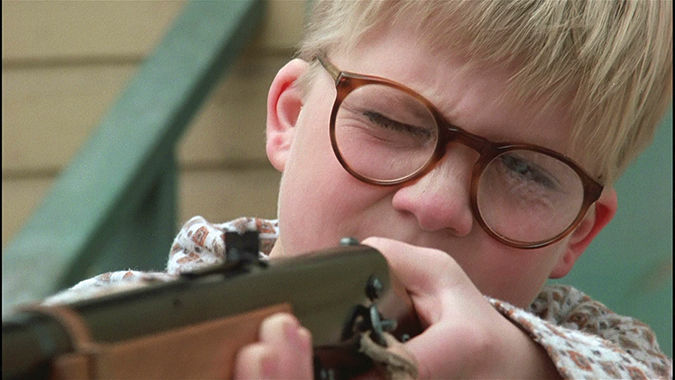The venerable Christmas staple “It’s a Wonderful Life” was a flop when it was released in 1946. It was Jimmy Stewart’s first role after fighting Nazi tyranny and leaving the United States Army Air Corps and for some reason, his portrayal of George Bailey just didn’t resonate to the post-war audience.
The movie was forgotten and would have remained so if not for a quirk in copyright law that placed the film into the public domain a few decades ago. This meant little local television stations starving for content could show the film without having to pay a licensing fee and thus a Christmas tradition was born.
In a similar way “A Christmas Story,” the tale of the boy who just wanted a Red Ryder BB gun for Christmas despite the warnings from his practical mother and every other adult within ear shot, that he would shoot his eye out, traveled a similar route to television immortality.
“A Christmas Story” came and went in a short-lived theatrical release in 1983. But it has become a phenomenon thanks to being resurrected on television. Once again TBS is going to be showing the film from Christmas Eve through Christmas Day over and over and over again.
As I watch many of the current shows on television, and as I have written about before, the world today has been turned on its head when it comes to the roles of adults and children with the line of demarcation between these two realms almost completely obliterated.
I think the very fact that a movie like “A Christmas Story,” set in a time that very few habitual watchers of its televised marathon have any semblance of familiarity with, draws the line so clearly between the worlds of adulthood and childhood, explains its universal appeal.
“A Christmas Story,” based on the short stories of humorist Jean Shepherd, is told from the point of view of Ralphie, who lives completely in the world of his childhood. He thinks his “schemes” to get his mother to relent against her “you’ll shoot your eye out” mantra will work.
He lives in fear of the neighborhood bully and he believes the essay he writes is the stuff of genius just waiting to be discovered by his schoolteacher. That scene reminded me of my own childhood when St. Elisabeth School was going to have a grade school-wide art show.
I thought I had created a compelling and multi-layered portrayal of the Battle of the Philippines with Japanese war planes going down in flames and triumphant ships of the U.S. 7th Fleet sailing the sea. Alas, my work was not chosen and I couldn’t believe the injustice of these philistines who couldn’t appreciate great art when it was staring them right in the face.
I went to the art exhibit anyway and saw nothing but pastoral settings of trees, barns, ponies and the odd still life. Not a single ode to American Naval power in the whole show.
Ralphie also marvels at the inscrutable nature of his father, played to perfection by the late Darren McGavin, as a jumble of contradictions which, to me, makes it a very real portrayal. The father does not inhabit the same universe as Ralphie and that’s the way they both prefer it.
Maybe again, it reminds me more of my own childhood than I want to admit — that uneasy truce between the adults and the non-adults all living under the same roof and neither camp fully understanding or all that interested in what the other camp was up to.
The “Christmas Story” dad occupies, reluctantly at times, but always with a grown up sense of inevitability, the adult world of dealing with horrible neighbors, a moody heating system and the world, completely alien to the kids, and to his wife as well, of thinking the “winning” of a grand prize of a spectacularly awful floor lamp is a cause for great celebration.
The advice of St. Paul comes through loud and clear in this movie as the children in “A Christmas Story” busy themselves with childish things and the adults with their more mature agendas. But what really makes this movie special to me and helps it rise above its already commendable humorous look at childhood and Christmas is what Ralphie’s “Old Man” does at the end.
The dad, who seemingly was completely self-absorbed with his own troubles, whether they be the billowing smoke of the basement heater or the hillbilly neighbors and their pack of wild dogs, wasn’t so out of step with the rhythms of his son after all.
There is a Red Ryder BB gun tucked away in a special hiding place on Christmas morning for Ralphie because his dad, in his own way, was paying attention. It is one of the sweetest moments in the movie.
Of course Ralphie then proceeds to nearly shoot his eye out with it and the lines are redrawn, the adults step back into their unfathomable dimension and Ralphie continues on his path until the day when it takes him beyond the things of a child.

